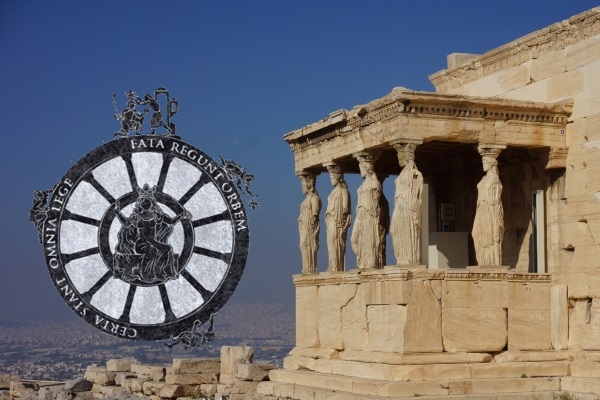Chris Brennan is a graduate of Kepler and the current the Vice Chair of the Kepler Board of Trustees. He recently released Hellenistic Astrology: The Study of Fate and Fortune and is the host of the award-winning Astrology Podcast.
Introduction to Astrology
 Chris has been vocal about his introduction to the field of astrology. He initially approached the topic from a modern point of view and it was with this frame of reference he enrolled in the degree program at Kepler.
Chris has been vocal about his introduction to the field of astrology. He initially approached the topic from a modern point of view and it was with this frame of reference he enrolled in the degree program at Kepler.
He has previously described himself as being forced to broaden his own perspective, an experience for which he is now grateful.
When asked about the introduction to traditional methodology he said, “You would learn different techniques – lots of different forms of astrology all working in different ways. It removed the idea that there was one true approach and one true astrology. Astrology as a language made more sense. Not saying German is better than French and they are just different ways of conveying information. This changes the scope of the debate and has informed the work I have done in the past ten years.”
Getting to Know the Author
Students of history and astrology typically have an expansive library and an ongoing desire to learn more. When invited to share his three favorite astrology books, Chris listed:
- Planets in Transit: Life Cycles for Living by Robert Hand -“Rob Hand set the standard for delineations. It’s a stunningly impressive book on transits and I’m looking forward to his updated version.”
- A History of Horoscopic Astrology by James Holden – “This is a great overview of the tradition of four thousand years and a focus on the biographies of the astrologers who’s work survived.”
- Anthology of Vettius Valens – “A series of textbooks for his students in Alexandria. It’s a recently translated treasure trove of techniques and observations. You get a real sense of this astrologer from two thousand years ago including his personal digressions. There is one point where he talks about traveling in search of a better timing technique and even apologizes for not getting the work out sooner.”
When asked about his favorite non-astrological books he admitted to reading very little fiction but that he had recently enjoyed the nonfiction books:
- How Rome Fell: Death of a Superpower by Adrian Goldsworthy
- Determinism and Freedom in Stoic Philosophy by Susanne Bobzien
Creating Hellenistic Astrology: The Study of Fate and Fortune
 The impetus behind the book began with his studies at Kepler. The introduction to the concept of sect and the difference between day and night charts were fascinating. He recognized the distinctions and implications were important and how they manifested altered the meanings of the chart.
The impetus behind the book began with his studies at Kepler. The introduction to the concept of sect and the difference between day and night charts were fascinating. He recognized the distinctions and implications were important and how they manifested altered the meanings of the chart.
Chris referenced the impact of the work completed by various translators as being an invaluable source of primary work from the Hellenistic period. While the translations were a great starting point, they are not necessarily ideal learning materials for those new to astrology as teaching methodologies and language have changed substantially since they were originally written.
He actively began to explore Hellenistic astrology in depth and recognized a need for a comprehensive historical text which brought the concepts together in a way that would make them accessible to those new to the field of study. He began writing the book he wished had been available to him.
The book itself is a comprehensive and remarkably well-cited exploration of the history of the tradition that makes the techniques and reasoning behind them clear to those at any level of astrological proficiency.
The text is just under 600 pages and is broken down into 18 chapters. Those who are most interested in the historical roots of Hellenistic Astrology will thoroughly enjoy the first five chapters which discuss Mesopotamian and Egyptian astrology, the Hellenistic period, and biographies of some of the most influential astrologers of the period.
The technical concepts are covered in chapters 6-16 and include philosophical issues, planets, signs, configurations, houses, house rulers, benefics and malefics, triplicity rulers, sect, and lots. The final two chapters of the book are two of the most interesting for students who want to learn more about the Hellenistic Time-Lord techniques are those on Annual Profections and Zodiacal Releasing.
The concept of these two techniques brings up the question of fate and free will. When asked if he believes in free will, he said, “I don’t know if I believe in the ability to make an unencumbered choice – no. Life is probably much more predetermined than people are comfortable realizing especially when you see how powerful zodiacal releases are. They are like book chapters in a person’s life.”
It is potentially due to this conflict in the idea of free will and the predetermination present in astrology that led to the decline of astrology. “The end of the Hellenistic tradition was due to free will and Christianity. Towards the end of the Roman Empire, it was a stumbling block because astrology and the concept of fate are intertwined.” He recommended Cosmology and Fate in Gnosticism and Graeco-Roman Antiquity by Nicola Denzey Lewis, Ph.D. for those interested in the topic.
After the final chapter, there are some notable extras. There is a concise four-page timeline covering the major points of astrological development from the 5th century BCE to the 8th century CE followed by an eleven-page glossary of important astrological concepts including the original Greek terminology where applicable.
Finally, a magnificent boon for bibliophiles and those interested in further research is the 24-page bibliography and extensive footnotes scattered throughout the text.
In April, Chris presented a webinar based on his work that showed a few Hellenistic techniques that modern astrologers could readily apply to their own practice.
{vimeo}222139072{/vimeo}
Those wishing to learn more about Chris and his work can find him at:



